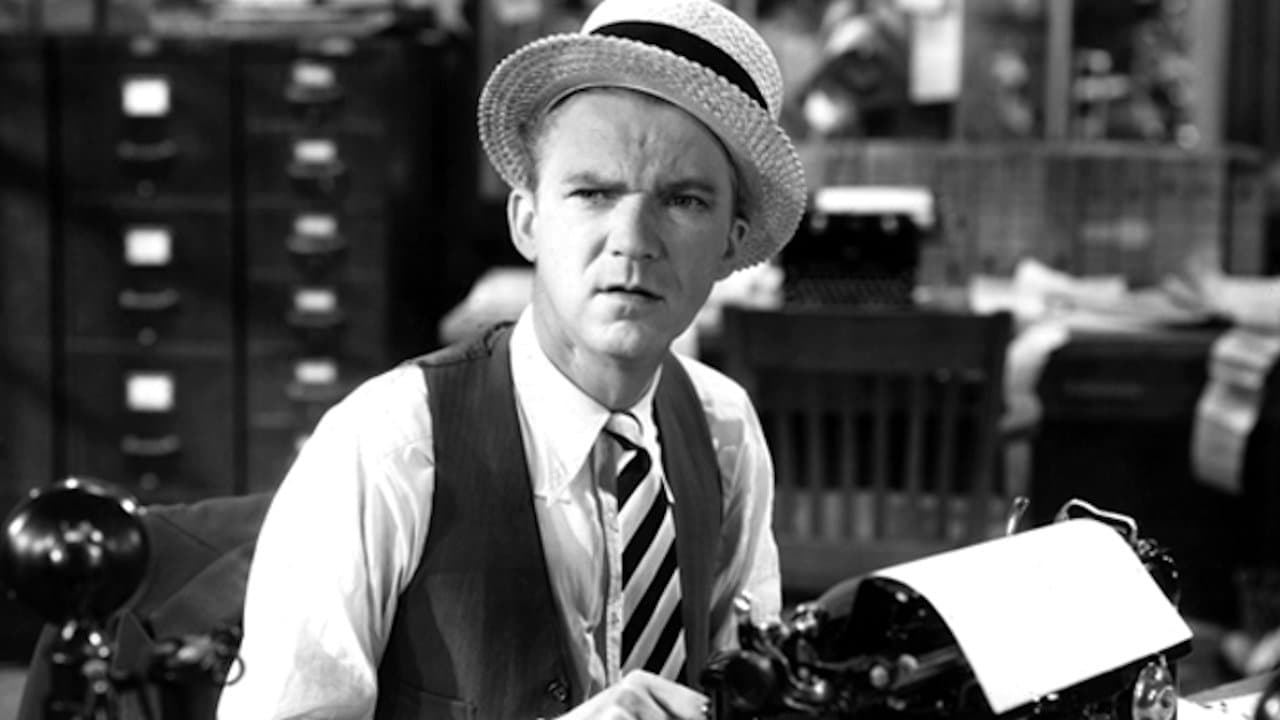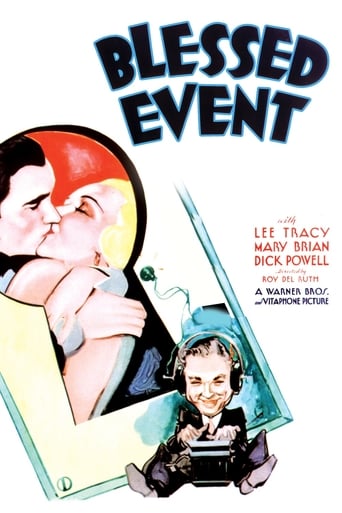

People are voting emotionally.
... View MoreIt's no definitive masterpiece but it's damn close.
... View MoreI like movies that are aware of what they are selling... without [any] greater aspirations than to make people laugh and that's it.
... View MoreThe film makes a home in your brain and the only cure is to see it again.
... View More"Blessed Event" is a parody of its time and of the media and entertainment of its day including newspapers and radio. But one wonders how exaggerated it really is. The sensationalism of the press and rise of yellow journalism was a frequent part of movie plots in the 1930s. But this one treats of another aspect as well – gossip. Lee Tracy plays Alvin Roberts, who quickly becomes a famous New York gossip columnist. The movie is billed as a drama and comedy. While there is comedy in Robets' character and some of the funny things he says, the drama of the film isn't lost on the audience. We soon feel the distastefulness of Roberts' gossip column. We soon see the inconsiderate character that he becomes. We soon see his ego and pride and relish for the power he has assumed. These are sad situations, and the film shows the tragic results of such power and behavior. Of course, amidst all of this we have occasional funny lines or clever comments. This film could be a biopic of a real person. Other reviewers have pointed this out. Roberts is as an obvious copy of Walter Winchell who was then on the rise as the king of gossip. Winchell was the original gossip columnist of Broadway and New York. He rose to such power through the press that politicians, the rich and famous, sports celebrities, gangsters, and actors feared him or tried to get close to him. Hedda Hopper and Louella Parsons would become the Walter Winchells of Hollywood. Lee Tracy's high-pitched voice and rapid-fire delivery closely emulate Winchell's persona. Although carried to the extreme for this film, those also were natural characteristics of Tracy. For a time, he was a leading actor in great demand. Some of his real lifestyle was similar to Winchell's. He was arrogant and seemed to bathe in the power of his position. Tracy also lived a racy, reckless, self-centered life. His temper, rowdiness and bad manners earned him a "bad-boy" reputation. He was given the boot from MGM after a public incidence in Mexico during filming of a movie there. Tracy urinated in public off a balcony and got in fisticuffs with the police. His later roles about hard-bitten, muck-racking, sensationalist reporters soon wore thin with the public. Tracy returned to the stage and later ended up on television in supporting roles. He had a successful marriage and apparently tamed down before his 1968 death from cancer at age 70.Winchell's fortunes were quite different. From the mid-1930s on, his star continued to rise through the 1950s. He had his own radio show and his newspaper column was syndicated in more than 2,000 papers worldwide. Winchell was very controversial. He had powerful friends and enemies. He was the first media personality to attack Adolf Hitler and the rise of Nazism. He also hated Communism and attacked the National Maritime Union during World War II as being a communist front. He admired Franklin D. Roosevelt and was invited to the White House. He also liked J. Edgar Hoover. Winchell was one of the earliest and most outspoken supporters of civil rights for African Americans. He attacked the Ku Klux Klan and other racist groups. He also supported Sen. Joseph McCarthy's efforts to ferret out communists in Hollywood. Winchell held court at the Stork Club in New York for years. But by the late 1950s, his appeal began to wane. And, his power dropped quickly. His family life was unstable and unconventional and experienced sad deaths. He lived alone his last two years in the Ambassador Hotel in Los Angeles. He died of cancer at age 74 in 1968.In this movie, Tracy's Roberts says repeatedly, "Pride ain't power." He has a few funny lines. "I almost started to death for two weeks," was one. The story is all about so-called "entertainment journalism." The supporting cast are fine, with Mary Brian doing an excellent job as Gladys Price, Roberts' secretary and right-hand man. This movie is interesting in its snapshot of the time and its parodies. It has some historical value for that reason. The cast and production values are all good. And, it's somewhat entertaining.
... View MoreUnless someone had spent some time with Admiral Byrd at the South Pole there ain't no way that any American would have not recognized that Lee Tracy's main character was based on Walter Winchell. Winchell had not started his radio show as of yet, but his column was the most read in the nation. And the term Blessed Event was a contribution that Winchell made to the English language still in use today. The play had a 115 performance run on Broadway and Allen Jenkins and IsabellJewell repeated their roles on Broadway. Tracy with a quip for all occasions takes over Ned Sparks's column and immediately makes his paper the biggest circulation in town. He takes on all, gangsters, politicians, show business personalities with an eye for the salacious. A man like that makes enemies and Winchell had plenty in his life.They also with a bit of future forecasting had him in a staged feud with another show business personality, a crooner played by Dick Powell in his film debut. Powell because this was his debut was no one that Winchell would have bothered with in real life. Powell's character was based on a combination of Rudy Valle and Russ Columbo both who led their own orchestras as Powell's character Buddy Harmon does. In real life Winchell would be in a bogus feud with bandleader Ben Bernie and the two would trade insults on their respective radio shows like Crosby and Hope.Blessed Event would be one of Tracy's best film roles until he got banished to the Bs for his performance in Mexico on a hotel balcony letting it all hang out and urinating on some passing Mexican soldiers while on location for Viva Villa.For a time this was dated, but as news gradually became more about the personalities delivering them, Blessed Event got right back in style. I think a young audience would really appreciate Blessed Event today.
... View MoreAt the start of BLESSED EVENT, Ned Sparks is returning from a vacation. He is the columnist who writes the society/gossip column at the newspaper. He left the column in the hands of his assistant, figuring that there was nothing outlandish that could happen. Sparks is soon sputtering, as he is asked by the newspaper editor to accept a new assignment writing obituaries. It seems that the assistant, Lee Tracy, has redesigned the column. Instead of the staid, boring columns giving the comings and goings of polite society (what boats they took to Europe, who is vacationing in Florida or the West Coast), he is telling of all the naughty things these people are up to. In particular, if he hears of a rumor that some prominent people are having a little baby out of wedlock, he prints the rumor (carefully mentioning it as a rumor - to avoid libel suits) as a "Blessed Event". Hence the film's title.Tracy keeps Ruth Donelly, Sparks secretary, as his own. He makes the column a really successful one, just as Walter Winchell did in real life in the 1920s. Winchell, who was one of the top gossip columnists of the 1920s - 1950s (his leading rivals were probably Hedda Hopper, Louella Parsons, and Sheila Graham - but they were basically connected with Hollywood personalities only, while Winchell included politicians, writers, artists, Broadway figures, socialites, and gangsters). Winchell knew many people - he even got involved in criminal history, when he was instrumental in the surrender of Louis Lepke Buchalter (head of "Murder, Inc.") to the authorities in 1939. Winchell's reputation is not very clean these days - he could be vicious if he did not like the politics or personality of one of his subjects. He would be ferociously anti-Communist in the 1940s and 1950s, although he also was anti-Nazi in the war years as well. The character of the unscrupulous Hunsekker in SWEET SMELL OF SUCCESS (the Burt Lancaster role) is based on Winchell.This film was made in his early years as a columnist, so Tracy plays him for laughs, and even makes him a bit of a crusader. He does pursue Dick Powell, a popular radio crooner, rather extremely. This is because he knows Powell is a phony, and Tracy does not like crooners. Later, though, it turns out that Tracy's mother does like Powell, and one wonders if that is the key to Tracy's feelings. On the other hand, he is leading a public spirited crusade against a crooked mobster and construction company head, Edwin Maxwell. That does raise our estimation of Tracy a bit.But his methods are always questionable. Maxwell tries to frighten Tracy into silence, sending his henchman Allan Jenkins to threaten him. Tracy makes a cylinder copy of a confession by Jenkins to a murder, and after making sure the cylinder has been taken away to safety, frightens Jenkins by telling him what he has on him, and reminding him of the death of Ruth Snyder in the electric chair in 1928. His morality is also tested, when Isobel Elsom comes to him with some personally shameful information, and Tracy has to decide if he should keep quiet or use it in his column.The speed of the film, the pungency of the dialog and its humor make it worth an "8" out of a possible "10". Tracy's performance reminds us of how wonderful an actor he was, and makes his odd career misfortune all the sadder to think about for what could have been a great career rather than a fine one.
... View MoreFast paced and very clever Lee Tracy vehicle playing a Walter W. type gossip columnist with a grudge against "crooners"generally and one in particular played by Dick Powell. Definitely precode with dialogue and subject matter that would have been totally rejected just a few years later. One scene culminates in a phrase spoken by Tracy's"mother" containg a word that rocked the film world at the end of Gone With the Wind. Among other wonderful sequences watch for Tracy's evocation of a trip to the "hot seat", and Dick Powell's rendition of a singing commercial extolling the qualities of"Shapiro's Shoes". With Shapiro himeself beaming at his side. Do catch this film also a similar effort also with Tracey "The Half Naked Truth".
... View More